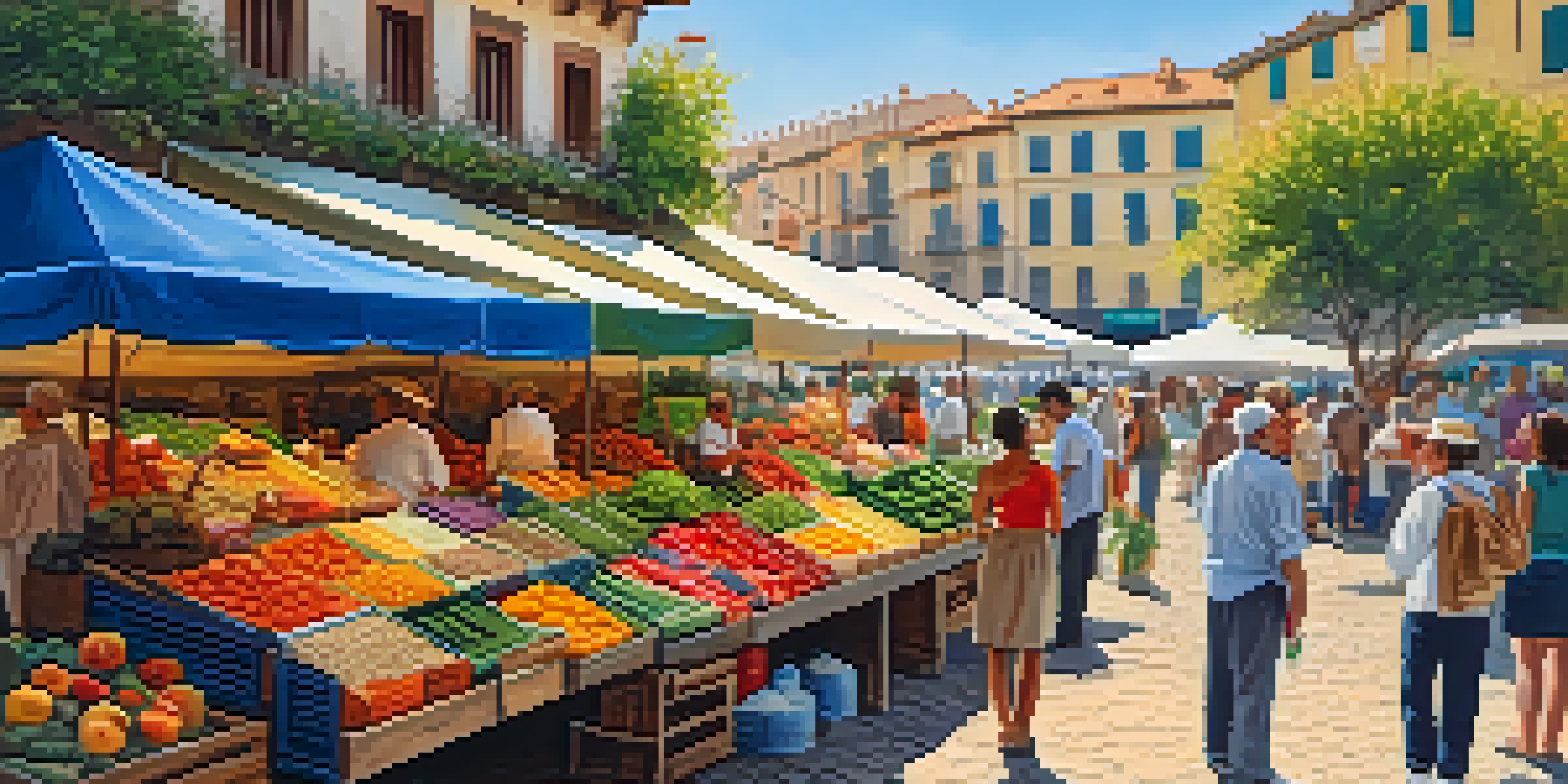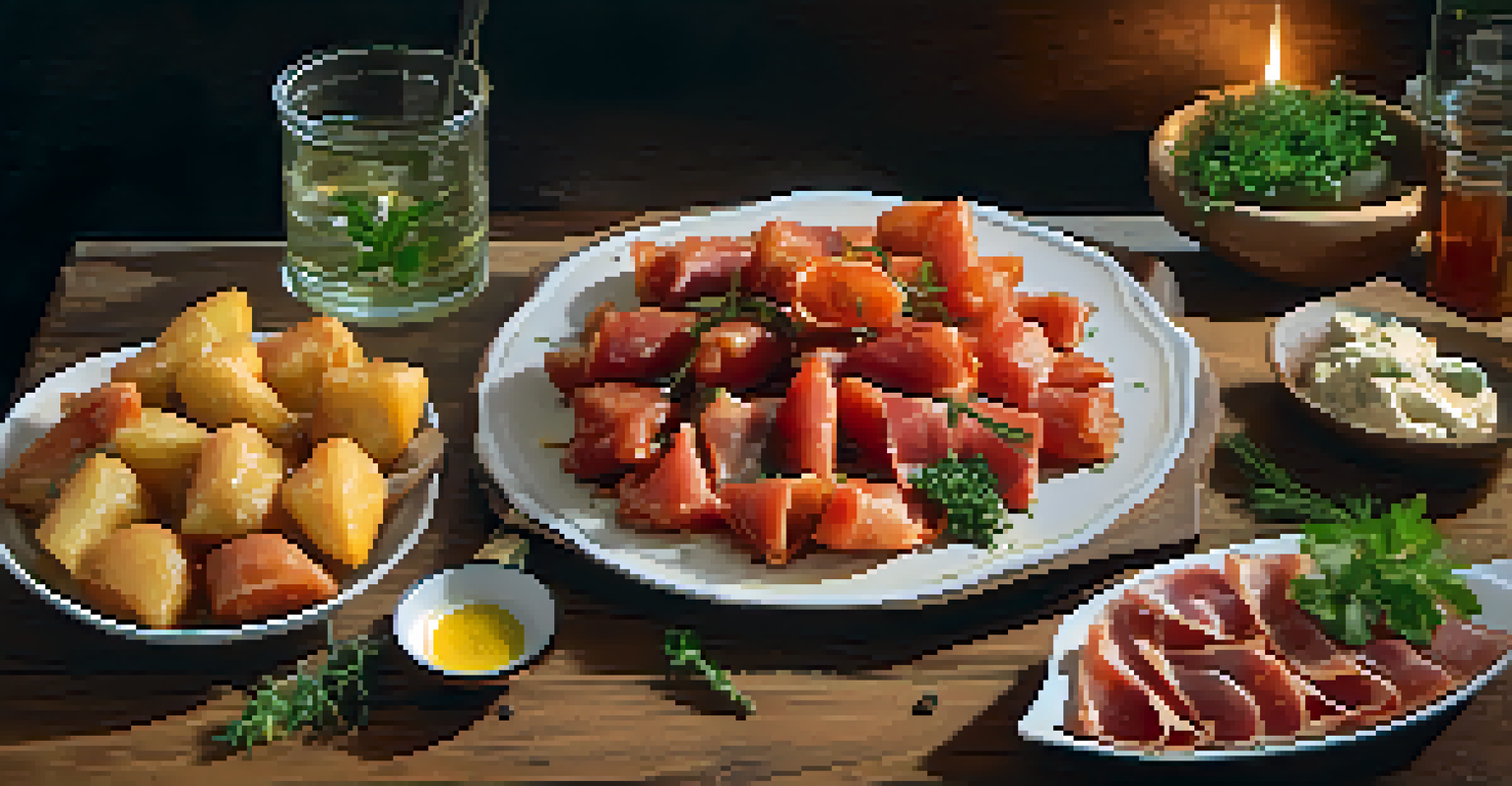A Culinary Odyssey: Discovering Spain's Hidden Food Gems

Unveiling the Hidden Culinary Treasures of Spain
Spain is a country rich in culinary traditions, yet many of its hidden gems remain undiscovered. While tapas and paella are beloved worldwide, lesser-known dishes offer unique flavors that tell the story of local cultures. Embarking on a culinary journey through Spain invites you to explore these authentic flavors and the communities that cherish them.
Food is not just what we eat. It is a way of connecting with the world around us.
In regions like Extremadura or La Mancha, local specialties like 'migas' and 'pisto' showcase the heart of Spanish cuisine. These dishes often use simple ingredients, highlighting the beauty of fresh produce and traditional cooking methods. By embracing these lesser-known foods, you’ll gain a deeper appreciation for Spain’s diverse gastronomy.
As you wander through quaint villages and bustling markets, keep your taste buds open to what lies beyond the tourist trails. Engaging with local chefs and home cooks can lead to delightful surprises, making your culinary odyssey all the more memorable. So, let’s dive into the hidden culinary treasures of Spain!
Exploring the Rich Flavors of Regional Specialties
Every region in Spain boasts its own culinary identity, shaped by geography and history. Take the time to savor dishes like 'bacalao al pil-pil' from the Basque Country or 'gazpacho' from Andalusia, which showcase local ingredients and cooking styles. Each bite reflects the essence of the region, creating a unique taste experience.

In Galicia, for example, the seafood is fresh and abundant, leading to iconic dishes like 'pulpo a la gallega' (octopus) that are a must-try. Similarly, in the heart of Andalusia, the use of tomatoes and peppers in dishes like 'salmorejo' creates a refreshing contrast to the warm climate. Regional specialties not only satisfy your palate but also tell a story of the land.
Discover Spain's Hidden Culinary Gems
Spain's lesser-known dishes offer unique flavors that reflect local cultures and traditions.
Exploring these varied flavors offers a deeper connection to Spain's diverse heritage. As you enjoy each dish, you’ll find yourself transported to the region it hails from, experiencing the culture through your taste buds. It’s a delicious way to understand the soul of Spain.
The Art of Tapas: Beyond the Basics
When you think of Spanish cuisine, tapas might be the first thing that comes to mind. However, the world of tapas extends far beyond the typical offerings found in tourist hotspots. In local bars and family-run taverns, you'll discover an array of creative and hearty tapas that reflect regional flavors.
Cooking is like love. It should be entered into with abandon or not at all.
From 'patatas bravas' in Madrid to 'almejas a la marinera' in Galicia, the variety is endless. Each region has its own take on what makes a perfect tapa, often incorporating seasonal ingredients and traditional cooking techniques. This diversity makes tapas an exciting way to sample multiple flavors in one meal.
By venturing off the beaten path, you can experience the true spirit of Spanish dining, where sharing plates fosters connection and conversation. So, next time you’re in Spain, seek out the hidden tapas gems that offer a taste of authenticity and local flair. Your palate will thank you!
Sweet Discoveries: Traditional Spanish Desserts
No culinary journey is complete without indulging in Spain's sweet offerings. While churros and flan are well-known, each region boasts traditional desserts that deserve a spotlight. From 'tarta de Santiago' in Galicia to 'pestiños' in Andalusia, these treats are often tied to local festivals and customs.
Many of these desserts use simple ingredients like nuts, honey, and spices, resulting in rich flavors that celebrate local culture. For instance, the 'tarta de la reina' from Valencia is a delightful almond cake that reflects the region's agricultural heritage. Exploring these sweets provides a sweet ending to your culinary adventure.
Experience Regional Culinary Diversity
Each region in Spain has its own culinary identity, showcasing distinct ingredients and cooking styles.
Visiting local bakeries and pastry shops can lead to unexpected delights, allowing you to experience the creativity and passion of Spanish bakers. Each dessert tells a story, and sampling these treats is a delicious way to connect with Spain's culinary history. Don’t miss out on these hidden sugar gems!
Vibrant Markets: The Heartbeat of Spanish Cuisine
A visit to Spain wouldn’t be complete without exploring its vibrant markets, where locals gather to buy fresh produce, meats, and seafood. Markets like La Boqueria in Barcelona and Mercado de San Miguel in Madrid are bustling with energy, showcasing the best of regional ingredients. These markets are a testament to the importance of fresh, quality food in Spanish cuisine.
Strolling through the stalls, you’ll encounter colorful fruits, aromatic spices, and artisanal cheeses that inspire countless dishes. Engaging with local vendors adds another layer to your culinary journey, as they share their knowledge and passion for their products. You might even pick up a few cooking tips along the way!
In addition to shopping for ingredients, many markets also offer delicious ready-to-eat meals. Sampling food from various stalls allows you to taste the essence of Spain in one place. These markets are not just about food; they embody the culture, community, and vibrant lifestyle of the Spanish people.
Savoring Spain's Wine Regions: A Liquid Journey
Spain is renowned for its wine, and exploring its various regions is like embarking on a liquid culinary journey. From the bold reds of Rioja to the refreshing whites of Rías Baixas, each wine region offers distinct flavors that pair beautifully with local dishes. Wine tasting is an experience that enhances your understanding of the culture and land.
Visiting vineyards provides insight into the winemaking process and allows you to meet the passionate individuals behind these exquisite bottles. Many vineyards offer tastings paired with local cheeses and charcuterie, showcasing the flavors of the region in perfect harmony. This hands-on experience is a highlight for any foodie traveler.
Engage with Local Food Festivals
Culinary festivals in Spain provide an opportunity to taste local dishes and connect with the community.
Don’t overlook the rising trend of natural wines and small-batch producers, who are crafting unique wines that reflect their terroir. By exploring Spain’s wine regions, you’ll not only savor delightful beverages but also gain a deeper appreciation for the intricate relationship between food and wine in Spanish culture.
Culinary Festivals: Celebrating Spain's Food Culture
Spain is home to numerous culinary festivals that celebrate its rich food culture, and attending one can be a highlight of your journey. Events like La Tomatina in Buñol or the San Sebastián Gastronomika showcase the creativity and passion of Spanish chefs and home cooks alike. These festivals offer a chance to taste a variety of dishes, often highlighting local ingredients.
Participating in these festivals allows you to engage with locals and other food lovers, creating a sense of community around shared experiences. You’ll find everything from cooking demonstrations to tastings, making it an educational and delicious adventure. It’s a wonderful way to dive deeper into Spain’s culinary identity.

Whether you're throwing tomatoes or sampling gourmet creations, these vibrant celebrations provide unforgettable memories. They serve as a reminder of how food brings people together, transcending boundaries and cultures. So, keep an eye out for culinary festivals during your visit to Spain—they're sure to enhance your gastronomic journey.